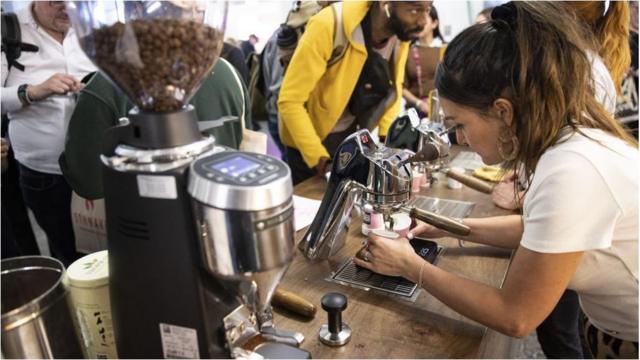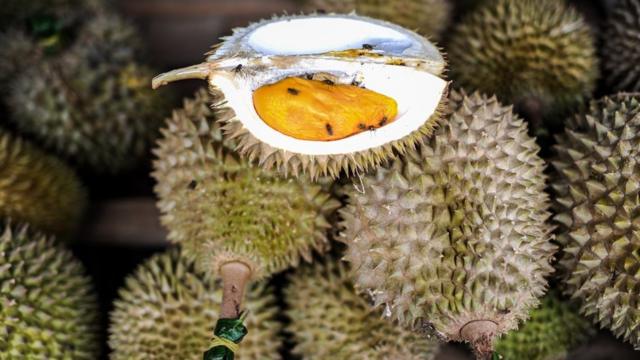
Drinking a cup of coffee refreshing, how much does it cost to pay too much?
In London or New York, drinking a cup of coffee priced at 5 pounds or $ 7 may be unimaginable for some people, but the "perfectness brought by the economic and environmental factors of the world's top coffee production areasStorm ", this may soon become a reality.
Analyst Judy Ganes said that the trading cost of unprecedented roasting coffee beans in the global market is currently at a "historical high."
Experts blame this series of factors, including coffee planting dilemma, market forces, exhaustion of inventory, and the most unpleasant fruits in the world.
How did we reach this step?How much does this have a latte coffee that people drink in the morning?
In 2021, an abnormal frost destroys Brazil's coffee crops.Brazil is the largest producer of Arabica Beans in the world. This variety is a coffee bean commonly used in coffee in cafeers.
The shortage of this Arabica coffee beans means that buyers turn to the main producers of Robusta Beans such as Vietnam and other Robusta. These coffee beans are usually used to make quick -soluble mixed coffee.
However, the farmers there are encountering the worst drought in the area in the past ten years this year.
Will Frith, a coffee sales consultant in Ho Chi Minh City, said climate change has been affecting the growth of coffee trees and the output of coffee beans.
Therefore, Vietnamese farmers have changed a kind of yellow fruit that smells stinky -durian.
Because of its unpleasant smell, Thailand, Japan, Singapore, and Hong Kong are prohibited from bringing such fruits to take public transportation, but this fruit is very popular in China and other places.

image source, AFP
Vietnamese farmers began to replace coffee trees with durian trees in order to profit from this emerging market.
The market share of durian grown in Vietnam has almost doubled between 2023 and 2024. It is estimated that the profit of local farmers growing durian is five times that of coffee.
Freis said: "Vietnamese growers have always been impermanent for market price fluctuations. After excessive investment, a large number of new crops have begun to pour into the market."
According to the International Coffee Organization, as Vietnamese durian poured into China, the export volume of Robusta coffee in Vietnam in June decreased by 50%year -on -year, and the inventory is now "close to exhaustion."
Coffee exporters in Colombia, Ethiopia, Peru and Uganda have increased their exports, but the output is not enough to alleviate market tensions.
Ms. Garnetus explained: "Just as the demand for Robusta coffee began to rise, the world was fighting for more supply."
This means that in the commodity market, the transaction price of Robusta and Arabica coffee beans is close to historical highs.
The market storm in the brewing
Will the changes in the global coffee economy really affect the price of coffee on the street?The brief answer is: possible.
Paul Armstrong, a wholesaler, believes that people drinking coffee may soon face the price of "crazy" coffee -that is, buying cups in the UK may cost more than 5 pounds.
He said: "This is a perfect storm."
Amsterrand runs a "Karara Coffee Bakery" in East Midezz, England. He imports coffee beans from South America and Asia, and then roasted coffee beans and sent to cafes from all over the UK.
He told BBC that he recently increased the price and hoped that this would reflect the higher price of the supplier, but he said that the cost "will only increase" since then.
He added that as some of his contracts will expire in the next few months, the cafe he runs will soon have to decide whether to pass higher costs to customers.
However, Fris pointed out that some areas of the industry will be more affected than other parts.
He said, "In fact, it will be commercial demand for the biggest interference. All of these are rising coffee, supermarket coffee, and gas stations."
Industry people warn that the high price of the coffee market may not necessarily be converted into higher retail prices.
FaFCOFFEES CEO Felipe Barretto Croce, CEO of FafCoffees, believes that consumers are "feeling pressure" as the price rises.
But he believes that this is "mainly due to overall inflation costs" rising, such as rent and labor, not coffee bean costs.According to the "Alegra Strategy" consulting company estimates, the price of coffee beans is less than 10%of the price of coffee.
Crozi said, "If you make coffee at home, coffee is still a very cheap luxury."
He also said that the rise in the cost of low -quality coffee beans means that high -quality coffee may now be regarded as more valuable.
He said: "If you walk into a boutique coffee shop in London to buy cups of coffee instead of drinking cups of coffee in the Costa Coffee, the price difference between that cup of coffee and special coffee is smaller than beforeMuch.
However, everyone's waiting price will come.Future coffee planting is reduced?

Crozi said that Brazil's coffee production accounts for one -third of the world's total, and the upcoming spring crops are now "vital".
He said: "Everyone is paying attention to when the rainfall will appear again." "If the rain returns soon, the crops will be healthy enough, and it should be good."
Crozi added that if the rainfall is postponed to October, the production forecast of crops next year will decline, and market pressure will continue.
In the long run, climate change has brought severe challenges to the global coffee industry.
A study in 2022 concluded that even if the greenhouse gas emissions significantly reduced the emissions of greenhouse gas, by 2050, the area that is most suitable for coffee may be reduced by 50%.
Crozi supports a future -oriented industry measure- "green premium", which will levy small taxes on coffee to support farmers' investment in regenerative agriculture, thereby helping and maintaining the survivability of farmland's survivability.Essence
Therefore, although the unpleasant durian fruit is part of the reason for the high price of coffee, climate change may eventually affect the burden on consumer coffee in the next few years.




